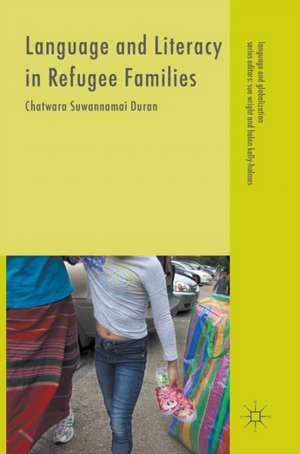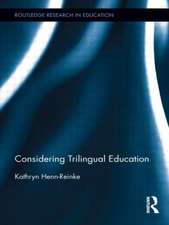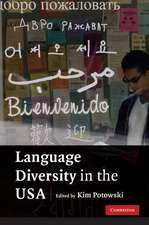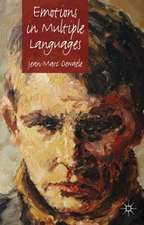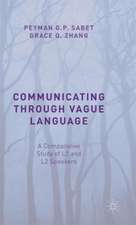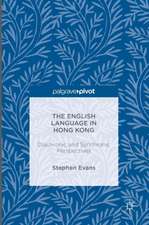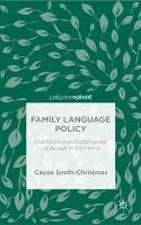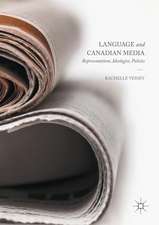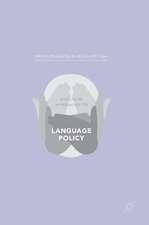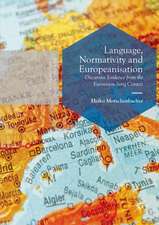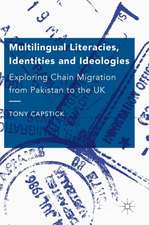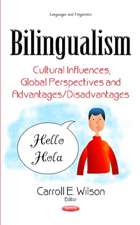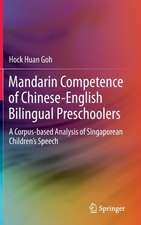Language and Literacy in Refugee Families: Language and Globalization
Autor Chatwara Suwannamai Duranen Limba Engleză Hardback – 19 dec 2016
| Toate formatele și edițiile | Preț | Express |
|---|---|---|
| Paperback (1) | 523.39 lei 6-8 săpt. | |
| Palgrave Macmillan UK – 20 iul 2018 | 523.39 lei 6-8 săpt. | |
| Hardback (1) | 696.50 lei 6-8 săpt. | |
| Palgrave Macmillan UK – 19 dec 2016 | 696.50 lei 6-8 săpt. |
Din seria Language and Globalization
- 17%
 Preț: 525.22 lei
Preț: 525.22 lei - 15%
 Preț: 643.84 lei
Preț: 643.84 lei -
 Preț: 383.93 lei
Preț: 383.93 lei - 18%
 Preț: 731.91 lei
Preț: 731.91 lei - 15%
 Preț: 638.11 lei
Preț: 638.11 lei - 15%
 Preț: 642.51 lei
Preț: 642.51 lei - 18%
 Preț: 727.18 lei
Preț: 727.18 lei - 15%
 Preț: 641.71 lei
Preț: 641.71 lei -
 Preț: 385.84 lei
Preț: 385.84 lei -
 Preț: 396.62 lei
Preț: 396.62 lei - 15%
 Preț: 646.62 lei
Preț: 646.62 lei - 15%
 Preț: 644.95 lei
Preț: 644.95 lei - 15%
 Preț: 635.15 lei
Preț: 635.15 lei - 15%
 Preț: 640.06 lei
Preț: 640.06 lei -
 Preț: 385.25 lei
Preț: 385.25 lei - 15%
 Preț: 702.87 lei
Preț: 702.87 lei -
 Preț: 389.70 lei
Preț: 389.70 lei -
 Preț: 386.22 lei
Preț: 386.22 lei - 15%
 Preț: 701.25 lei
Preț: 701.25 lei - 15%
 Preț: 640.71 lei
Preț: 640.71 lei - 15%
 Preț: 696.82 lei
Preț: 696.82 lei -
 Preț: 389.70 lei
Preț: 389.70 lei - 18%
 Preț: 946.87 lei
Preț: 946.87 lei -
 Preț: 392.60 lei
Preț: 392.60 lei -
 Preț: 384.86 lei
Preț: 384.86 lei -
 Preț: 382.36 lei
Preț: 382.36 lei -
 Preț: 383.93 lei
Preț: 383.93 lei - 15%
 Preț: 641.71 lei
Preț: 641.71 lei - 15%
 Preț: 638.43 lei
Preț: 638.43 lei - 15%
 Preț: 647.40 lei
Preț: 647.40 lei -
 Preț: 388.52 lei
Preț: 388.52 lei -
 Preț: 388.13 lei
Preț: 388.13 lei - 15%
 Preț: 640.88 lei
Preț: 640.88 lei
Preț: 696.50 lei
Preț vechi: 819.41 lei
-15% Nou
Puncte Express: 1045
Preț estimativ în valută:
133.27€ • 139.15$ • 110.30£
133.27€ • 139.15$ • 110.30£
Carte tipărită la comandă
Livrare economică 05-19 aprilie
Preluare comenzi: 021 569.72.76
Specificații
ISBN-13: 9781137587541
ISBN-10: 1137587547
Pagini: 208
Ilustrații: XXI, 226 p. 18 illus., 15 illus. in color.
Dimensiuni: 148 x 210 x 20 mm
Greutate: 0.41 kg
Ediția:1st ed. 2017
Editura: Palgrave Macmillan UK
Colecția Palgrave Macmillan
Seria Language and Globalization
Locul publicării:London, United Kingdom
ISBN-10: 1137587547
Pagini: 208
Ilustrații: XXI, 226 p. 18 illus., 15 illus. in color.
Dimensiuni: 148 x 210 x 20 mm
Greutate: 0.41 kg
Ediția:1st ed. 2017
Editura: Palgrave Macmillan UK
Colecția Palgrave Macmillan
Seria Language and Globalization
Locul publicării:London, United Kingdom
Cuprins
Chapter 1: Introduction: Refugee, Language, and Literacy.- Chapter 2: “But, we are Karenni. We are not Burmese.”: Historical Contexts and Lived Experiences of Karenni Refugees from Burma.- Chapter 3: The Three Families.- Chapter 4: Life, Liberty, and (the Pursuit of) English.- Chapter 5: Karenni Youth, Multilingual Practices, and Transnational Literacy.- Chapter 6: Digital Literacy in the Karenni Families.- Chapter 7: Revisiting Transnationalism and Key Resources.- Chapter 8: Conclusion and Implications.
Notă biografică
Chatwara Suwannamai Duran is Assistant Professor of Applied Linguistics in the Department of English, University of Houston, USA. She has worked with Karenni refugees since 2009, completing her PhD in Curriculum and Instruction with a concentration in Language and Literacy at Arizona State University in 2012. As an ethnographer, she utilizes multiple qualitative methods to explore language learning trajectories and literacy practices among immigrant and refugee families in the United States.
Textul de pe ultima copertă
This book examines the agreements and discrepancies between public understanding and assumptions about refugees, and the actual beliefs and practices among the refugees themselves in a time of increasing mobility fuelled by what many call 'refugee crisis’. With a focus on language and literacy practices among recently-arrived Karenni refugee families in the United States, this book explores the multilingual repertoires and accumulated literacies acquired through the course of the refugees' multiple movements. Through the lens of transnationalism, the author emphasizes that despite their numerous struggles, the refugees daily and diligently use and strategize their old, emerging, and evolving linguistic and literacy resources to make the best of their resettlement. This book will shed light on the language and literacy practices among transnational and diasporic communities, minoritized or marginalized groups for researchers in these fields as well as practitioners and resettlement agencies working with refugee populations.
Caracteristici
Strives to understand contested language ideologies, literacy practices and language learning trajectories among newly-arrived refugee children and their families Challenges the view that refugees are illiterate and socioeconomically disadvantaged Explores refugees’ transnational literacies, multilingual capital, and accumulated cross-cultural knowledge
